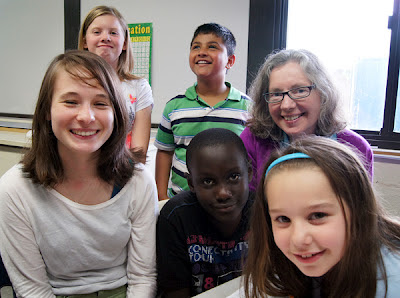My friend Suzy texted me last week to tell me she was listening to a wonderful piece on NPR’s TED Radio Hour about “grit”. Here’s the link to the story, entitled Is Having Grit the Key to Success?
The concept of grit or perseverance keeps coming up in my work, because the first math practice standard in the Common Core is “Make sense of problems and persevere in solving them”...and, more importantly, because teachers and parents know that determination and the ability to cope with failure is paramount to student success.
Last night I had the pleasure of speaking with Connie Knodt, a relatively new member of my family. She was featured recently on WCAX’s Super Senior series. Connie is 79 years old and still works 28 hours a week at Fletcher Allen Hospital in the pediatric ward. Here’s the link to her story. Connie and I had a great conversation about how she was able to transcend a difficult childhood to become an IBM engineer when few women did such a thing. I asked if she could remember anyone who was an important role model for her when she was young. Without hesitating, she told me about two top-notch high school teachers who inspired her to become to lifelong learner she is today. She remembered their names and talked in detail about how her geometry teacher asked the students to build structures rather than assigning pages in a textbook.
Connie’s story reminds us that teachers are so important. One great teacher can turn a life around.
Connie is also a living testament to grit. She’s interested in solving tough problems and never being finished with her own learning. She told me that at work if there’s a new computer system, medical device, or scheduling conundrum, they bring it to her. She’s happy to take on the challenge.
The concept of grit or perseverance keeps coming up in my work, because the first math practice standard in the Common Core is “Make sense of problems and persevere in solving them”...and, more importantly, because teachers and parents know that determination and the ability to cope with failure is paramount to student success.
Last night I had the pleasure of speaking with Connie Knodt, a relatively new member of my family. She was featured recently on WCAX’s Super Senior series. Connie is 79 years old and still works 28 hours a week at Fletcher Allen Hospital in the pediatric ward. Here’s the link to her story. Connie and I had a great conversation about how she was able to transcend a difficult childhood to become an IBM engineer when few women did such a thing. I asked if she could remember anyone who was an important role model for her when she was young. Without hesitating, she told me about two top-notch high school teachers who inspired her to become to lifelong learner she is today. She remembered their names and talked in detail about how her geometry teacher asked the students to build structures rather than assigning pages in a textbook.
Connie’s story reminds us that teachers are so important. One great teacher can turn a life around.
Connie is also a living testament to grit. She’s interested in solving tough problems and never being finished with her own learning. She told me that at work if there’s a new computer system, medical device, or scheduling conundrum, they bring it to her. She’s happy to take on the challenge.




